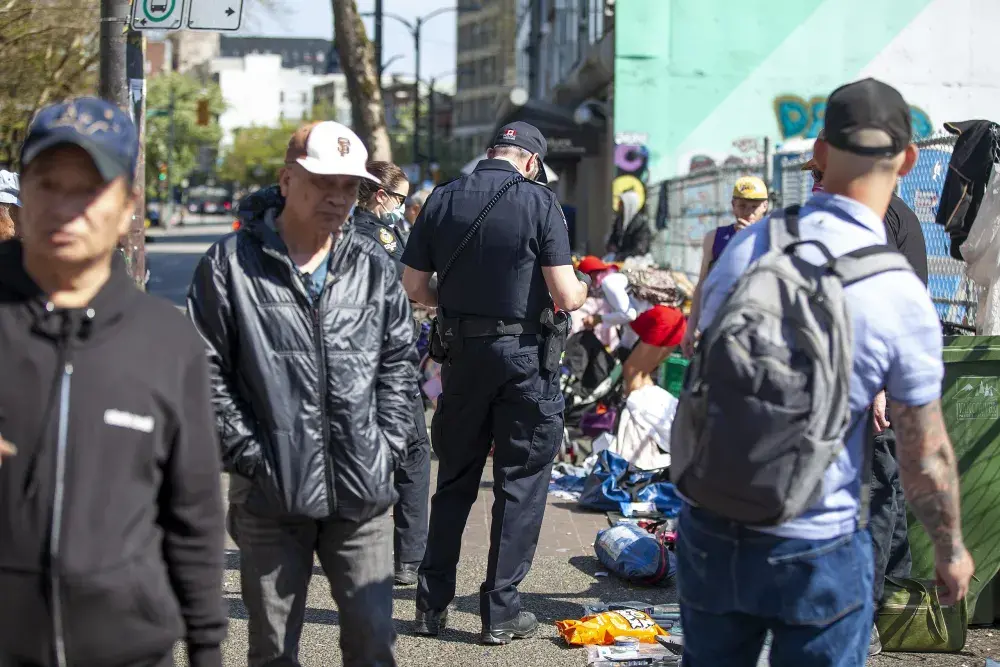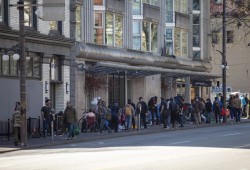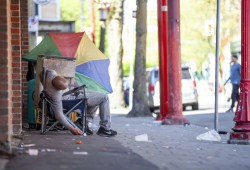The first Youth Outreach Centre has launched in Vancouver’s Downtown Eastside (DTES) for young people struggling with homelessness, as well as mental and physical-health challenges.
The new centre, operated by Vancouver Coastal Health (VCH) and located at 786 Powell St., will save lives by connecting young people from age 15 to 24 to crucial mental-health and substance-use supports, states the province.
According to a news release from the Ministry of Mental Health and Addictions, approximately 75 per cent of serious mental-health issues emerge before the age of 25.
In addition to the centre, the province is expanding the multi-disciplinary outreach team from two workers to eight, including mental-health and substance-use nurses, youth care workers, an Indigenous peer advocate and social workers.
"Young people have faced significant challenges over the last few years and their well-being continues to be our top priority," said Jennifer Whiteside, minister of Mental Health and Addictions, in the news release. "The Downtown Eastside Youth Outreach Centre, which is the first of its kind, will help connect young people to the supports they need and deserve on their journey to wellness, as our government continues to build a system of mental-health and addictions care from the ground up."
Data from the 2020 Homelessness and Supportive Housing Strategy by the City of Vancouver shows that 2,095 individuals identify as homeless in the metropolitan arear—547 of whom are unsheltered and 1,548 sheltered. Of the unsheltered individuals, 52 per cent of them marked the DTES as where they reside.
Nine per cent of the more than 2,000 individuals who identify as homeless are youth (under age 25) and 36 per cent said they are, or were, in the care of the Ministry as a child or youth. Forty-eight per cent of respondents first experienced homelessness under the age of 25.
The report states people who are homeless consistently experience a range of health issues including addiction (60 per cent) and mental health issues (45 per cent).
The report also shows that Indigenous people are over-represented among homeless in Vancouver at 39 per cent, whereas Indigenous people make up two per cent of the general population.
It’s similar in the Alberni Valley. In the 2021 Port Alberni homeless count, 65 per cent of individuals identified as Indigenous, up from 48 per cent in 2018. That is compared to 17 per cent of the city’s general population who identify as Indigenous.
To help create a culturally safe space at the new DTES Youth Outreach Centre, VCH collaborated with three Coast Salish artists, including a young painter who created murals that adorn the walls.
"Meeting this population where they are is fundamental to the work we're doing," said Emily Giguere, VCH clinical planner for Youth Substance Use Services, in a press release. "They are sometimes difficult to find. They may not have a fixed address or phone number and they are often distrustful of the health-care system. It's the best way to connect them to the care they need, where and when they need it. However, the goal has always been to have a home base: a safe, welcoming hub where the team works from and where clients can easily find them."
The team heads out to the streets of Vancouver to meet vulnerable youth to build a rapport and connect them to mental-health, addictions and health-care services. These teams also distribute harm-reduction supplies, such as naloxone, as well as basic necessities like sleeping bags, socks, food and drinks.
Last year the Province of B.C. enhanced mental-health and substance-use services for young people across B.C. The province has added 33 new and expanded substance-use programs, supported by approximately 130 new health-care workers, specifically for young people.
In the Alberni Valley, The Youth Short Term Assessment and Response Team (YSTAR) was highlighted as a new service funded by the province to seek out and help youth before substance issues escalate. YSTAR teams are based in Campbell River, Nanaimo, Port Alberni, the Cowichan Valley and Mount Waddington.
“The creation of YSTAR teams across six communities on Vancouver Island is significantly increasing connection, supports and service access for highly vulnerable children and youth experiencing severe mental-health challenges and are using harmful substances,” said Tenille Lindsay, member of the Port Alberni YSTAR team. “As a former emergency department nurse, I know the value of quickly and effectively connecting youth and, where appropriate, their support persons with community-based services and supports.”



